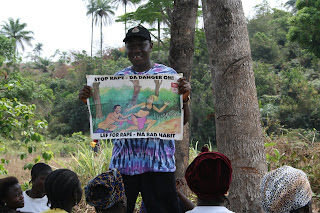The first day of the workshop took us to Marvekonedu, a Mandingo village. The Mandingos are a Muslim tribe and were very active in the war. This particular ex-combatant group only has one male member who also happens to be the only English speaker. I didn’t feel comfortable walking up to one of them and asking “so what was your role in the war?” but that doesn’t mean I wasn’t curious. They ranged in age- some of them had to have been children during the war while a couple struck me as being quite old. This was just another reminder of how no one was unaffected: young, old, male, female.
The workshop itself was held in a mud house with all the children dying to get a look at the “vabu” (that would be me) and the adults constantly shooing them away. The children are timid here- nothing like Uganda- although there were a few that finally worked up the courage to touch me and then attempted to talk to me (alas, my Mandingo is not what it used to be). The workshop itself was fascinating, no, MIND BLOWING. The facilitator began by making a series of statements in which the participants were to raise their hands if they agreed. #1: A man has the right to demand sex from his wife at any time. All hands went up. #2: The wife has the right to say no to her husband. Four out of eight hands go up. #3: A husband has a right to beat his wife. All hands go up. Absolutely unreal. How can a country possibly develop when the entire MINDSET of the country needs to be changed? I heard recently that approximately 65% of Liberian women have been raped- an estimate that the UN believes to be too low. Like I said, mind blowing. We began by discussing the difference between sex and gender (what is biological and what is social), power, people in power, age of consent, and rape and its consequences. However, I am very happy to report that with this particular group, when the statements were read again at the end of the session, everyone disagreed on #1, all but one disagreed about #2, and the majority disagreed on #3. Progress.
The rest of the week was a success and I was so encouraged by the thought of conducting other workshops that Jamila handed the task over to me. So, my new project has been to line up different organizations that will come and talk to our groups on a range of subjects. IMC (International Medical Corps) will come and speak about general health, sanitation, child care, HIV/AIDS, etc. and the UN Human Rights and Protection officer will speak about human rights, the rights of a Liberian citizen, and how to be a good citizen. Needless to say I am excited about the potential impact this may have.

Mustafa, the IRC facilitator, is holding a poster commonly used as a billboard around Liberia. Note the "Special Liberian English".
No comments:
Post a Comment